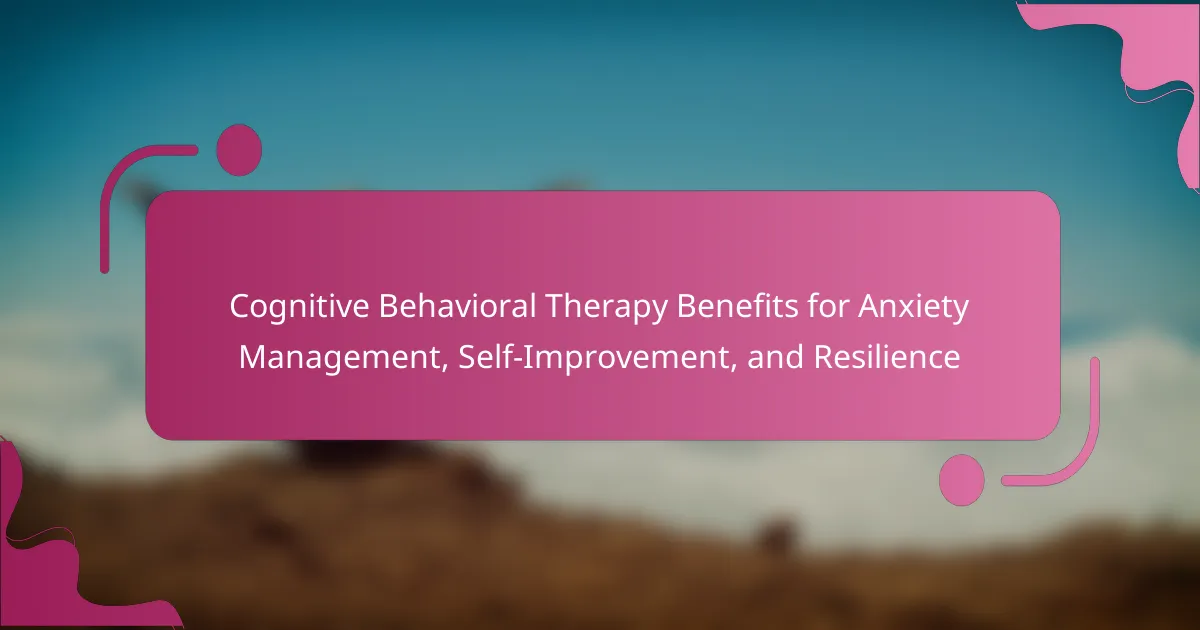Cognitive Behavioral Therapy (CBT) effectively reduces anxiety symptoms and enhances self-improvement. It equips individuals with coping strategies, promotes emotional regulation, and fosters resilience. Research shows significant long-term benefits, including improved mental health and sustained personal growth. This structured approach empowers individuals to navigate life’s challenges with greater strength and awareness.
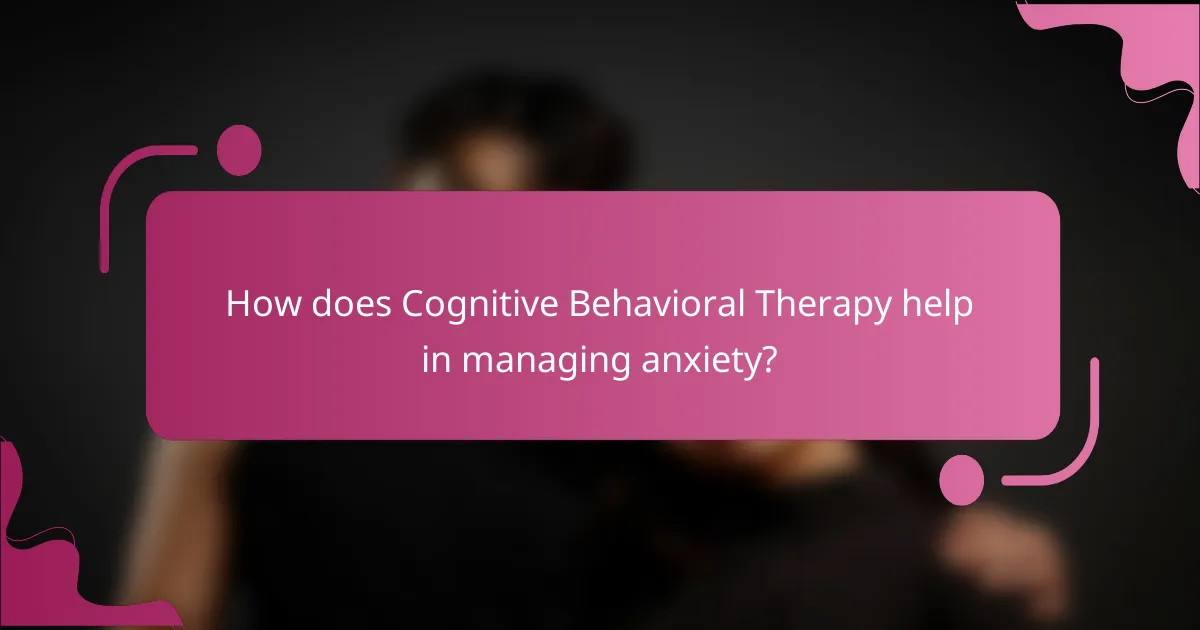
How does Cognitive Behavioral Therapy help in managing anxiety?
Cognitive Behavioral Therapy (CBT) effectively manages anxiety by changing negative thought patterns. It empowers individuals to identify triggers and develop coping strategies. CBT enhances self-awareness, promotes resilience, and fosters emotional regulation. Studies show that 60-80% of individuals experience significant improvement in anxiety symptoms after completing CBT. This therapy’s structured approach allows for measurable progress, making it a preferred method for anxiety management.
What are the key techniques used in CBT for anxiety?
Cognitive Behavioral Therapy (CBT) employs several key techniques to manage anxiety effectively. These techniques include cognitive restructuring, exposure therapy, mindfulness practices, and behavioral activation.
Cognitive restructuring helps individuals identify and challenge negative thought patterns. Exposure therapy gradually exposes individuals to anxiety-provoking situations, reducing fear responses. Mindfulness practices enhance awareness and acceptance of thoughts and feelings, promoting emotional regulation. Behavioral activation encourages engagement in positive activities to counteract avoidance behaviors.
These techniques collectively empower individuals to develop resilience and improve self-management of anxiety.
Which symptoms of anxiety can be effectively treated with CBT?
Cognitive Behavioral Therapy (CBT) effectively treats various anxiety symptoms, including excessive worry, panic attacks, and social anxiety. CBT helps individuals identify negative thought patterns and develop coping strategies. Research shows that CBT can reduce symptoms by up to 60% in many cases. Additionally, it enhances resilience by equipping individuals with skills to manage future anxiety.
How does CBT compare to other anxiety treatment options?
Cognitive Behavioral Therapy (CBT) is often more effective than other anxiety treatment options due to its structured approach. CBT focuses on changing negative thought patterns, which leads to improved emotional regulation and coping strategies.
In comparison to medication, CBT has longer-lasting effects without the risk of dependency. While medications can provide immediate relief, CBT equips individuals with tools for long-term management. Studies show that CBT can reduce anxiety symptoms significantly, with up to 60% of participants reporting substantial improvement.
Additionally, CBT promotes self-improvement and resilience, empowering individuals to face challenges proactively. Unlike some alternative therapies, CBT is evidence-based, supported by extensive research and clinical trials. This makes it a preferred choice among mental health professionals for treating anxiety disorders.

What are the benefits of Cognitive Behavioral Therapy for self-improvement?
Cognitive Behavioral Therapy (CBT) offers significant benefits for self-improvement by enhancing anxiety management and building resilience. It equips individuals with practical skills to challenge negative thoughts, leading to improved emotional regulation and behavior modification.
CBT fosters self-awareness, enabling individuals to identify triggers and develop coping strategies. This therapeutic approach encourages goal setting, which enhances motivation and personal growth. Research indicates that CBT can result in a 50% reduction in anxiety symptoms for many participants.
Additionally, CBT promotes resilience by teaching individuals how to reframe challenges and setbacks as opportunities for learning. This shift in perspective strengthens problem-solving abilities, making it easier to navigate life’s difficulties. Overall, the benefits of CBT significantly contribute to self-improvement and emotional well-being.
How can CBT enhance personal growth and self-awareness?
Cognitive Behavioral Therapy (CBT) enhances personal growth and self-awareness by promoting healthier thought patterns and behaviors. It equips individuals with tools to identify and challenge negative beliefs, fostering resilience and emotional regulation. CBT encourages goal-setting and self-reflection, leading to increased self-knowledge and improved decision-making. This therapeutic approach can significantly reduce anxiety symptoms, enabling personal development and a more fulfilling life.
Which skills can be developed through CBT?
Cognitive Behavioral Therapy (CBT) helps develop skills such as emotional regulation, problem-solving, and coping strategies. These skills enhance anxiety management, self-improvement, and resilience in daily life. CBT fosters self-awareness by encouraging individuals to identify and challenge negative thought patterns. As a result, participants become more adept at managing stress and building healthier relationships.
What role does CBT play in building self-esteem?
Cognitive Behavioral Therapy (CBT) significantly enhances self-esteem by reshaping negative thought patterns. It helps individuals identify and challenge self-defeating beliefs, fostering a more positive self-image. CBT techniques, such as cognitive restructuring, empower individuals to replace harmful thoughts with constructive ones. This process builds resilience and promotes self-acceptance, leading to improved overall well-being. As a result, individuals often experience increased confidence and a healthier outlook on life.
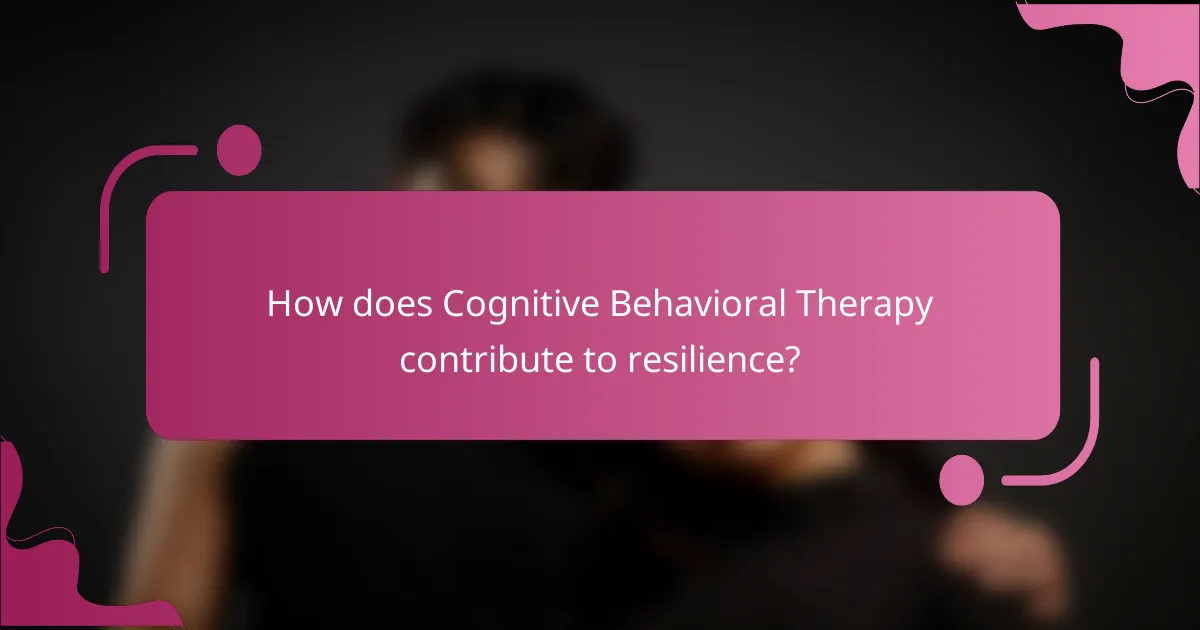
How does Cognitive Behavioral Therapy contribute to resilience?
Cognitive Behavioral Therapy (CBT) enhances resilience by equipping individuals with effective coping strategies. It helps reframe negative thought patterns, fostering a positive mindset. This process builds emotional strength, enabling better responses to stress and adversity. Studies show that CBT significantly reduces anxiety symptoms, promoting long-term resilience.
What techniques in CBT foster resilience in individuals?
Cognitive Behavioral Therapy (CBT) techniques that foster resilience include cognitive restructuring, exposure therapy, and mindfulness practices. These methods help individuals challenge negative thoughts, confront fears, and stay present, enhancing coping skills.
Cognitive restructuring enables individuals to identify and alter distorted thinking patterns. This process promotes a more balanced perspective, which is crucial for resilience. Exposure therapy gradually exposes individuals to anxiety-provoking situations, reducing avoidance behaviors and building confidence. Mindfulness practices encourage individuals to focus on the present moment, reducing stress and enhancing emotional regulation.
Research indicates that individuals who engage in CBT techniques report improved resilience and better management of anxiety symptoms. These approaches empower individuals to develop a proactive mindset, ultimately leading to sustained personal growth.
How does resilience impact overall mental health?
Resilience significantly enhances overall mental health by promoting effective coping strategies. It allows individuals to manage stress, adapt to challenges, and maintain emotional stability. Cognitive Behavioral Therapy (CBT) fosters resilience by teaching skills to reframe negative thoughts and behaviors. This process not only alleviates anxiety but also encourages self-improvement, leading to a more robust mental state. Studies show that resilient individuals experience lower levels of depression and anxiety, highlighting the importance of resilience in mental well-being.
Which populations benefit most from resilience training through CBT?
Populations that benefit most from resilience training through Cognitive Behavioral Therapy include individuals with anxiety disorders, trauma survivors, and those facing chronic stress. These groups often experience heightened emotional challenges, making resilience training essential for improving coping strategies and overall mental health.
Research indicates that children and adolescents, particularly those in high-stress environments, also gain significant advantages from such training. Additionally, healthcare professionals and first responders can enhance their resilience through targeted CBT techniques, addressing the unique stressors of their roles.
Overall, resilience training through CBT is beneficial for diverse populations seeking to improve emotional regulation and stress management skills.
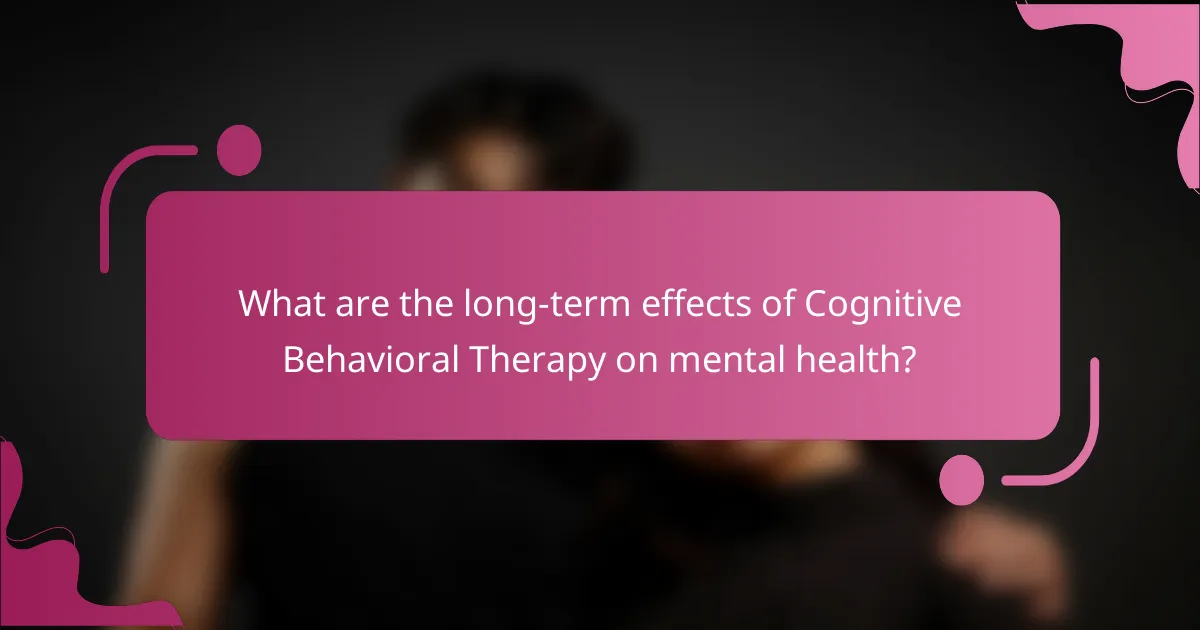
What are the long-term effects of Cognitive Behavioral Therapy on mental health?
Cognitive Behavioral Therapy (CBT) has long-term positive effects on mental health, including reduced anxiety, improved self-esteem, and increased resilience. Studies show that individuals who undergo CBT often experience lasting changes in thought patterns and behaviors, leading to sustained mental wellness.
CBT equips individuals with coping strategies that help manage anxiety effectively over time. Research indicates that about 60% of participants maintain their improvements for years after therapy. Furthermore, CBT fosters self-improvement by encouraging goal-setting and personal growth, which can enhance overall life satisfaction.
Resilience is another critical benefit of CBT. By teaching individuals to challenge negative thoughts and reframe situations, CBT helps build a stronger mental framework for facing life’s challenges. This skill set not only aids in managing current issues but also prepares individuals for future stressors.
In summary, the long-term effects of Cognitive Behavioral Therapy on mental health are profound, promoting sustained anxiety management, self-improvement, and resilience.
How does CBT influence relapse rates in anxiety disorders?
Cognitive Behavioral Therapy (CBT) significantly reduces relapse rates in anxiety disorders by equipping individuals with coping strategies. CBT focuses on identifying and changing negative thought patterns, enhancing emotional regulation, and promoting resilience. Research indicates that individuals who engage in CBT show a 50% lower likelihood of relapse compared to those who do not receive this treatment (Hofmann et al., 2012). This therapeutic approach fosters long-term self-improvement by empowering patients to manage anxiety symptoms effectively and maintain mental well-being.
What evidence supports the effectiveness of CBT over time?
Cognitive Behavioral Therapy (CBT) demonstrates sustained effectiveness for anxiety management over time. Research indicates that CBT leads to significant reductions in anxiety symptoms, with benefits persisting for months or even years after treatment completion.
Studies show that approximately 60-80% of individuals experience a reduction in anxiety symptoms post-CBT, and follow-up assessments reveal that many maintain these improvements long-term. This durability is attributed to CBT’s focus on equipping individuals with practical coping strategies and cognitive restructuring techniques.
Moreover, a meta-analysis of numerous studies highlights that CBT not only alleviates anxiety but also fosters resilience and self-improvement. Participants report enhanced problem-solving skills and increased self-efficacy, which contribute to ongoing emotional well-being even after therapy concludes.
In summary, the evidence supports CBT’s long-term effectiveness in managing anxiety, promoting resilience, and facilitating self-improvement through the development of essential coping skills.
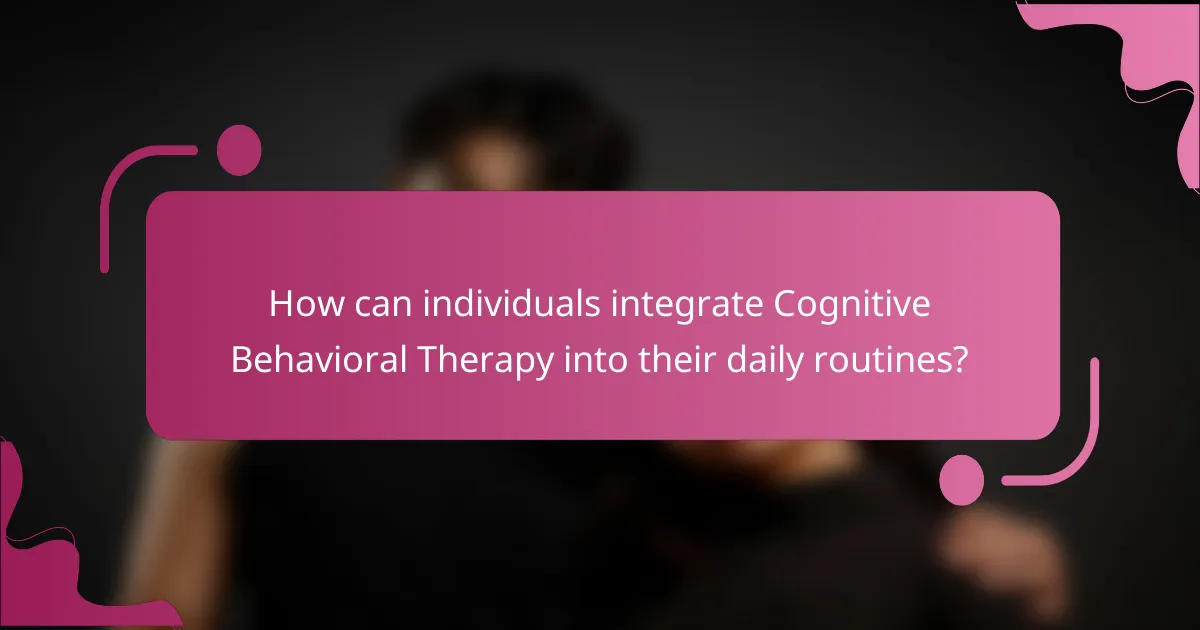
How can individuals integrate Cognitive Behavioral Therapy into their daily routines?
Individuals can integrate Cognitive Behavioral Therapy into daily routines by practicing specific techniques consistently. Start by identifying negative thought patterns and challenging them with evidence-based reasoning. Incorporate mindfulness exercises to enhance self-awareness and emotional regulation. Schedule regular reflection periods to assess progress and adjust strategies as needed. Engage in goal-setting to maintain motivation and track improvements in anxiety management and resilience.
What practical exercises can be applied in everyday life?
Practical exercises for applying Cognitive Behavioral Therapy in everyday life include journaling, thought challenging, mindfulness meditation, and behavioral activation. These techniques enhance anxiety management, promote self-improvement, and build resilience.
Journaling allows individuals to track thoughts and emotions, fostering self-awareness. Thought challenging involves identifying negative beliefs and replacing them with positive alternatives. Mindfulness meditation cultivates present-moment awareness, reducing anxiety. Behavioral activation encourages engagement in enjoyable activities, improving mood.
How can one maintain the benefits of CBT after therapy ends?
To maintain the benefits of Cognitive Behavioral Therapy (CBT) after therapy ends, individuals should practice skills learned during sessions regularly. Consistent application of cognitive restructuring, mindfulness techniques, and exposure strategies enhances anxiety management and resilience.
Engaging in self-reflection through journaling can reinforce self-improvement. Additionally, setting achievable goals fosters a sense of accomplishment. Regularly seeking support from peers or support groups can provide motivation and accountability.
Utilizing digital resources, such as CBT apps or online forums, can further aid in sustaining progress. Practicing self-care routines, including exercise and healthy eating, also supports mental well-being.
Overall, maintaining CBT benefits requires commitment to ongoing practice and self-awareness.
What common mistakes should be avoided when practicing CBT techniques?
Common mistakes to avoid when practicing Cognitive Behavioral Therapy (CBT) techniques include neglecting to track progress, skipping homework assignments, and failing to challenge negative thoughts effectively. Practitioners should consistently document their experiences to identify patterns and measure growth. Engaging with assigned tasks enhances understanding and application of concepts. Additionally, it is crucial to actively confront and reframe negative thoughts rather than allowing them to persist unexamined.
Which resources are recommended for ongoing CBT practice?
Recommended resources for ongoing CBT practice include self-help books, online courses, therapy apps, and support groups. These tools enhance anxiety management, self-improvement, and resilience.
1. Self-help books: “Feeling Good” by David D. Burns, “The Feeling Good Handbook.”
2. Online courses: CBT-focused platforms like Coursera or Udemy.
3. Therapy apps: Moodfit, Woebot, or Sanvello for guided exercises.
4. Support groups: Local or online communities for shared experiences.
Utilizing these resources can reinforce CBT techniques and foster long-term mental health benefits.
